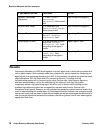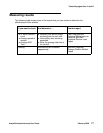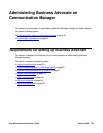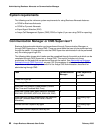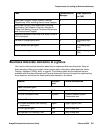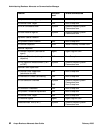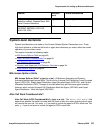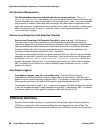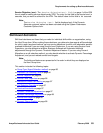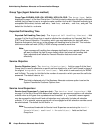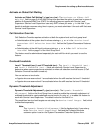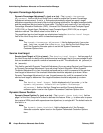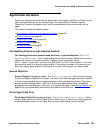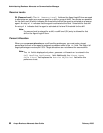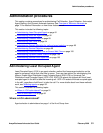
Administering Business Advocate on Communication Manager
84 Avaya Business Advocate User Guide February 2006
Call Selection Measurement
Call Selection Measurement: predicted-wait-time or current-wait-time - The Call
Selection Measurement: field applies only if you are using Greatest Need or Skill Level (not
Percent Allocation) as a call selection method. Predicted-wait-time is the recommended
entry because it results in fewer calls with exceedingly long wait times and optimizes critical
agent skill resources. It predicts how long a call will have to wait if the currently available agent
does not answer the call. An entry of current-wait-time selects calls based on their
current wait time in queue.
Service Level Supervisor Call Selection Override
Service Level Supervisor Call Selection Override? y (yes) or n (no) - Call Selection
Override works in conjunction with Service Level Supervisor to determine how calls are
selected for agents when overload thresholds are exceeded. When this feature is administered,
calls are selected from skills that are over threshold to the exclusion of skills that are under
threshold. Additionally, calls that have exceeded the level 2 threshold are selected to the
exclusion of calls that have exceeded the level 1 threshold.
This feature is administered at both the system level and skill level. While it must be activated
separately for each skill (using the Hunt Group form), it can be turned on and off system wide
through the Service Level Supervisor Call Selection Override? field on the
System-Parameters Features form. This eliminates the need to turn it off for each individual
skill. The default for this field on the Feature-Related System Parameters form is y, which
enables the feature.
Auto Reserve Agents
Auto Reserve Agents: none, all, or secondary-only - The Auto Reserve Agents
enhancement provides the ability to leave an agent idle even when one or more calls are in
queue for one or more of the agent’s assigned skills. This decision is made using a comparison
of the agent’s work time in the skill and the agent’s target allocation for the skill.
The default for this field is none. If all is entered, the agent is left idle if the agent’s work time
in that skill exceeds the agent’s target allocation for that skill. If secondary-only is entered,
this feature applies only to the agent’s nonprimary skills (skill levels 2 to 16).
VDN-level decisions
Dynamic Queue Position allows you to queue calls from multiple Vector Directory Numbers
(VDNs) to a single skill, while maintaining different service objectives for those VDNs. The
decision to administer this enhancement is made using the VDN form and the Hunt Group form.



